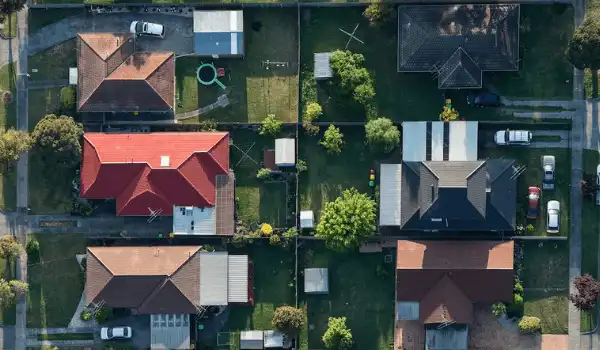Should I sell my house now or wait? 2025
The past few years have been a rollercoaster ride for Australian property. Prices soared by +28.6 per cent over the pandemic boom before rising interest rates caused a downturn in 2022. A remarkable rebound that started in 2023 pushed home values back to record levels in 2024 and, following a short and shallow downturn around the New Year period, prices have been rising steadily in 2025.
Monthly price growth on the national level was given a significant boost thanks to interest rate cuts in February, May, and most recently in August, meaning we have seen climbing growth around Australia. Clearly, there's a lot to consider for anybody thinking about listing their home.
Is it best to take advantage of the current conditions in what broadly remains a seller's market? Or is there value in waiting to see how things unfold over the coming months?
Whether you choose to sell isn’t just about current market conditions, but also the urgency of your own personal circumstances. For some of us, we needed to upsize into a bigger property yesterday, while for others, waiting for the market to rise might be a good incentive to release more capital before retirement.
Let’s explore the current real estate climate, the pros and cons of waiting versus selling now, and what economists believe is on the horizon for the months ahead.

Get a free property value estimate
Find out how much your property is worth in today’s market.
Should I sell my house now or wait?
Whether you choose to sell or not to sell isn’t just about current market conditions, but also the urgency of your own personal circumstances. For some of us, we needed to upsize into a bigger property yesterday, while for others, waiting for the market to rise might be a good incentive to release more capital before retirement.
Here are some high-level factors to consider when weighing up your options.
When it’s a good time to sell a house
- Property prices have been growing in your suburb (or, similar properties are selling for a price you're happy with)
- Days on market (DOM) in your area is low (properties are selling fast)
- Auction clearance rates are high in your suburb
- There are many buyers attending open homes and auctions in your area
- You've built up equity in your property
- Your property doesn't need any major repairs
- You're ready to downsize, relocate or just move on
When you should wait before you sell
- Market conditions in your suburb are weak, i.e. falling prices, high DOM, low auction clearance rates
- Buyer activity and confidence in your area is low
- You’re likely to sell at a loss or haven’t built enough equity
- Your property needs significant repairs or upgrades
Helpful resource: Get a suburb profile for any suburb in Australia
The current state of the market
According to Cotality data, Australia's median property price is still breaking new records after months of solid gains.
CoreLogic Australian Home Value Index - October 2025
| Market | Month | Quarter | Annual | Median value |
|---|---|---|---|---|
| Sydney | 0.7% | 2.3% | 4.0% | $1,256,156 |
| Melbourne | 0.9% | 1.6% | 3.3% | $818,975 |
| Brisbane | 1.8% | 4.9% | 10.8% | $992,864 |
| Adelaide | 1.4% | 3.2% | 6.7% | $867,681 |
| Perth | 1.9% | 5.4% | 9.4% | $884,471 |
| Hobart | 0.3% | 0.5% | 2.4% | $686,262 |
| Darwin | 1.6% | 5.4% | 15.4% | $564,473 |
| Canberra | 0.6% | 1.7% | 3.2% | $877,937 |
| Combined capitals | 1.1% | 2.9% | 5.6% | $959,526 |
| Combined regional | 1.0% | 2.4% | 7.5% | $710,573 |
| Australia | 1.1% | 2.8% | 6.1% | $872,538 |
After slumping in 2024, Sydney and Melbourne are both rebounding with strength, bringing quarterly growth of 2.3 per cent and 1.6 per cent respectively, thanks to stronger buyer activity after interest rates have fallen.
Perth, Brisbane and Adelaide all continue to reach new heights, continuing after a remarkable run in recent years, and the pace of growth has ramped back up in the second half of 2025.
Hobart and Canberra have continued to see relatively nominal growth this year, while Darwin is enjoying an extended boom on its own that's reminiscent of 2021's price surges. Regional markets are charging on, closely matching their capital city counterparts.
On an annual basis, houses have outperformed units, and that gap has recently extended to around record levels — the median Australian house now costs nearly $237,000, or +33.3 per cent more, than the median unit.
Australian property market forecast
Interest rates have been a key talking point since they began rising in May 2022 and, since the RBA began its latest rate-cutting cycle in February 2025, they're still in the daily headlines.
The runaway inflation seen in recent years looked to have been all but conquered by a period of high interest rates, driving inflation back within the RBA's target levels, leading the central bank to feel comfortable with cutting rates further in 2025.
But, following a third rate reduction for the year in August 2025, all four of the big banks are predicting no further cuts in 2025, with CBA expecting the cutting cycle to be over.
Again, looking to the big banks, their latest price forecasts show continued growth, though slower than we saw throughout 2025.
Big banks' Australian property price forecast 2026
| Bank | 2026 national forecast |
|---|---|
| Westpac | 4.0% |
| NAB | 4.1% |
| ANZ | 5.8% |
| CBA | 4.0% |
Domain's latest Price Forecast Report for 2026 painted a slightly rosier picture, predicting that house prices across the capitals would rise +6 per cent over FY26 compared to +5 per cent for units.
"The range of capital city price growth is expected to narrow. Sydney and Melbourne are forecast to lead, since they typically respond faster to interest rate changes," the report read.
"Meanwhile, Adelaide and Perth – standout performers over recent years – are set for slower positive growth as affordability constraints mount. Brisbane unit prices are expected to moderate from previously unsustainable double-digit growth, while house prices continue to grow at a pace similar to last year."
The report adds that there are "downside risks tied to weakening affordability and population growth, while upside risks include more aggressive rate cuts and stronger-than-expected responses to government support programs."
What are the upsides in the current market?
After the major ups and downs of our property markets between 2020 and 2024, things now look to be in a stable and strong position in the closing stages of 2025.
The most obvious benefit for sellers is that the national median property price continues to hit new all-time highs. Over a five-year period since the start of the pandemic, the median Australian home value shot up more than +45 per cent.
In Brisbane, Perth and Adelaide, that number has soared beyond +75 per cent, meaning the vast majority of sellers who have held their property for even four years look set to make a very substantial profit.
The ongoing issue of housing undersupply in the face of high levels of immigration over an extended period is continuing to support property prices, too.
PropTrack explained that "Given the current trajectory, it's unlikely that 1.2 million new homes will be built in the next five years. This means we’re likely to continue to see an undersupply of homes to buy and an undersupply of homes to rent."
More affordable properties, or those that may be considered entry-level, are also delivering above-average gains around the country which may help those looking to upgrade from a smaller house or unit. Now that the federal Labor government's Home Guarantee Scheme has been vastly expanded, that effect may only increase.
"First home buyers, they're out in force at the moment," Sydney real estate agent Renee Cross told the ABC.
"[The changes to the scheme] will absolutely create urgency in the market, buyers will be wanting to buy, because they'll want to get into the market right at this point," she said.
Ultimately, prices are at or near record levels in many markets across the country, and looking back over the past few years there has been an exceptional level of growth for home values.
See what houses are selling for in your area with a free property report of your local area.
Is it a buyer's market or a seller's market right now?
In a city like Perth, which has seen stunning rates of monthly price growth over the past two years, well below-average listings, strong buyer demand, and lightning-fast days on market, it's easy to apply the 'seller's market' label.
In many other cases, though, the task isn't quite as simple, particularly when looking down to a suburb level.
Assessing whether a market is balanced or favours either sellers or buyers requires looking at a range of data as well as getting a first-hand feel of what's happening on the ground.
Some of those key data points include price movements, auction clearance rates, new and total listing levels, sales volumes, average days on market and vendor discounting rates.
But the data can only tell you so much. It's also worth heading along to nearby open homes and auctions to get a sense of what the competition is like on both the selling and buying sides.
Our simple guide to tracking market trends and data will walk you through everything you need to know to be able to read the market and make a smarter selling decision.
What to do before deciding to sell
If you’re still on the fence about selling, we get it. It’s a huge decision that deserves all your careful consideration weighing up the advantages and disadvantages for either scenario.
Whether your property is impacted by price gains or falls depends on many factors including location, property type, and whether your home falls into the higher or lower end of the market.
If you’re seriously considering selling your home, you need to do your research. As a first step, get an estimate of what your home might be worth in today's market.
Speaking to a top local agent is also one of the best ways to get a thorough understanding of how buyers are behaving in your suburb, what kinds of results are still being achieved, and what the best strategy could be for you to still get that dream sale result.
At the very least, it’s helpful to hear what properties are selling for, what demand is currently like for homes like yours, and to get a no-obligation appraisal of what your home might sell for in the current market. A top agent who knows your market like the back of their hand will be able to help you along the journey.
How do I know if it is a good time to sell a house?
Some of the reasons why it might be worth considering selling your house now include:
1. Favourable market conditions: Selling your house when property prices are rising could allow you to make a significant profit. During this time, there is a higher chance of competitive offers and higher sale prices. Data-led signals like Days on Market (DOM) falling, auction clearance rates rising, or vendor discounting rates decreasing can also indicate a strong seller's market.
2. Changing personal circumstances: Life events such as marriage, divorce, retirement, or a growing family may prompt the need to sell your house. It's important to assess your current situation and consider how your home aligns with your evolving needs.
3. Maintenance and repair costs: If your home requires significant repairs or maintenance, selling it now could save you from further expenses. Selling the property as-is can sometimes be better than investing time and money into renovations, especially if it no longer meets your needs or preferences.
4. Investment opportunities: Selling your house can provide you with the funds to invest in other ventures, such as starting a business or investing in stocks, bonds, or other properties. Assessing the potential returns and weighing them against the benefits of homeownership is crucial in making an informed decision.
How long should I wait to sell my house?
How long you wait before selling your house might vary depending on a number of variables, including:
1. Market circumstances: Keep an eye on the local housing market for trends. You might be able to sell quickly and for a good price if there is a seller's market with high demand and little inventory. However, you might need to exercise more patience or think about using different tactics if there is a buyer's market with a lot of available inventory and poor sales.
2. Individual circumstances: Take into account your unique situation and any life occurrences that might have an impact on your decision to sell. Do you have any plans to move, downsize, or upgrade? Do you have a changing family dynamic or are you suffering financial difficulties? Knowing your own requirements and objectives will enable you to choose the best time to sell.
3. Seasonal factors: Seasonal variations in real estate activity are possible. Because of the nicer weather and higher customer activity, spring and summer are typically the busiest seasons for sales, although other times of year may still be advantageous. To find any seasonal patterns that can affect the timing of your sale, research the previous sales data for your local area.
4. Home preparation: You might need some time to get your house ready for the market before selling. De-cluttering, making repairs or renovations, staging, and hiring a photographer are a few examples of what this entails. Give yourself enough time to make sure your home is displayed in the best possible way, since this may have a big impact on how marketable it is and how much it sells for.
Is it a good time to sell investment properties?
Current market conditions are a bit of a double-edged sword for property investors.
On the one hand, an extremely tight rental market is providing incentives. SQM Research data shows national vacancy rates still very low at just 1.2 per cent in July, while rental rates have soared +7.5 per cent per annum over the past three years.
At the same time, interest rates rose a full +4.25 per cent over just 18 months, driving mortgage repayments far higher, although rate cuts are now starting to arrive to provide some relief.
How the two forces play out largely depends on an investor's loan balance. Some investors are opting to sell up to avoid inflated repayments, while others with lower or nil balances may benefit from the current rental market dynamics.
Should I sell my house now or wait until 2026?
There’s no one-size-fits-all answer. Property cycles keep turning—buyers and sellers are active in every market—so the real question is how things look in your suburb for your goals.
Start by getting granular: check recent sales, price trends and any forecasts for your particular area. A free online estimate is useful, but pairing that with insights from a top-performing local agent is even better. The right agent can tell you how buyer demand, days on market and pricing are tracking street-by-street and suggest the best strategy—whether that’s listing soon or holding until conditions improve.
Bottom line: do the homework, lean on local expertise, and decide based on your timeline rather than chasing a perfect date on the calendar.








